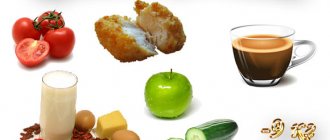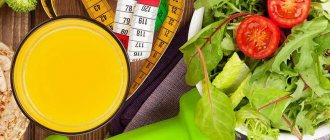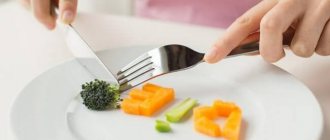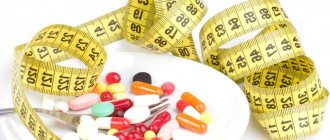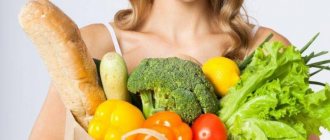Weight loss options and possible health risks
Depending on your goal, you can get rid of 2 to 7 kg of excess weight in 7 days. It's all about the chosen weight loss strategy. You can achieve minus 7 kg in 7 days if you are on a strict diet, for example, buckwheat or drinking. Having chosen such an extreme method of losing weight, you need to be prepared for the fact that certain harm will be caused to your health, because for a long week the body will not receive the vitamins, proteins, fats and carbohydrates it needs. He will use up his reserves, which he will rush to replenish immediately after leaving the diet. Actually, this is the second risk of emergency weight loss - the inevitable return of the “escaped” kilograms, or rather, part of them.
Weight loss
A result of minus 2 kg per week can be achieved by using a more gentle method of losing weight without strict diets and strenuous exercise in the gym. It's about proper nutrition. This method is good for a number of reasons:
- no harm to health is caused;
- a habit of healthy foods is developed;
- The “melted” kilograms are guaranteed not to return.
Important! With any method of losing weight, the first kilogram lost is excess water and toxins, and not hated fat.
What are the consequences of extreme weight loss
- Imagine this situation: before your trip to the south, you for a long time forbade yourself from all the most beloved and delicious things, and became a little slimmer. Then they attacked the forbidden sweets. The result is severe cramps in the abdomen, sick pancreas and liver. All this could have been avoided if there had not been a sharp transition from starvation to gluttony.
- The second problem that awaits all supporters of radical measures is that having lost weight in a short time, we do not get the expected relief, but skin that hangs in folds.
- Severe abdominal pain can occur not only from overeating, but also from a sharp reduction in the amount of healthy fats received (from vegetable oils, avocados, etc.). And this is one of the main conditions of many express diets. The result of such deprivation is the formation of gallstones, accompanied by fever, nausea and pain.
So decide for yourself what is more important to you - quickly get rid of 5-10 kilograms or maintain health.
Who is losing weight slower?
How much weight can you lose in a month?
Why do some boast of their “minus 7” in a week, while others, under the same conditions and diets, barely achieve 0 in the same 7 days? This figure depends on a number of factors:
- a person's weight before losing weight. Fat people get rid of the first 2-3 kilograms much faster than thin people who just want to correct their figure;
- health problems. It is much more difficult for people with diseases of the heart, gastrointestinal tract and excretory system to lose weight;
- little time to sleep. Scientists have proven that everyone who suffers from insomnia is more likely than others to become obese, as they simply eat away their stress;
- wrong lifestyle. What's the point of going on a diet if you drink alcohol and smoke cigarettes before or immediately after going off it?
A combination of training, diet and running

By combining diet with sports exercises, you can lose maximum fat in a month. The stronger the physical activity, the faster the calories disappear. Intense loads allow you to burn up to 800 kkl per hour. There are only 9 kcl in 1 g of fat mass. This means that 90 g of fat is consumed in 1 workout, excluding water.
Optimal weight loss is only possible if you combine exercise with proper nutrition:
- Introduce protein foods into your diet;
- Give up sugar, sweets, baked goods;
- Consume carbohydrates, except vegetables, in the morning;
- Drink plenty of water.
If you train with dumbbells, stretch, run and count calories, you can burn 6 kg in a month. While exercising, gradually increase the load. You can purchase a pedometer and track the kilometers traveled per day.
How much weight can you lose by playing sports?
How much weight can you lose if you don't eat for 3 days?
Many people mistakenly believe that running a couple of kilometers in the morning is enough to safely eat their favorite foods all day long and not think about extra calories. Alas, this is not entirely true. Any physical exercise, of course, requires additional energy expenditure, but the “smart” body quickly replenishes these same calories, taking them from food. It follows from this that losing weight only through physical exercise is illogical, because the result, even if there is one, will be negligible.
So, if during the week you spend 2 hours every day doing aerobics, gymnastics or other sports, then the weight loss will be on average minus 1-2 kg.

Sports activities
TOP 5 fat-burning physical exercises
Any physical activity accelerates your metabolism, which means it helps you lose weight. But not all types of exercise lead to the same results. For example:
- for a person who dares to lose 2 kg in 7 days without resorting to the help of a nutritionist, it is best to run 3-5 km a day, at least on a treadmill;
- Hula hooping will help get rid of sagging belly fat;
- the jump rope will force all muscle groups to work;
- walking - Scandinavian or regular - will contribute to the proper functioning of the respiratory and digestive systems;
- With the help of squats, you can significantly reduce the volume of your buttocks and hips.
Important! During exercise, the body not only burns a lot of calories, but also a lot of water, which is released due to improved metabolism and sweating. Therefore, 1 hour before training you should drink 250-400 ml of clean water.

Walking - Scandinavian
What can extreme weight loss lead to?

The result of radical methods of resetting everything at once is a deterioration in well-being, an exacerbation of old diseases and the emergence of new ones:
- functional intestinal disorders (constipation, diarrhea);
- the appearance of acne;
- sagging skin;
- slowing down metabolism;
- weakness;
- fast fatiguability;
- gastritis, ulcers and other diseases of the gastrointestinal tract;
- disorders of the liver and kidneys;
- decreased brain activity.
And this is not a complete list. Take care of your health - lose weight the right way, not quickly.
How effective is PP without physical activity?
How much weight can you lose in a month on proper nutrition?
Recently, you can increasingly hear from leading nutritionists that in order to lose weight, you need to eat well and consume all types of healthy foods, but in reasonable quantities. This is the main principle of PP. And after that, advice will certainly follow on what types of physical exercises should be performed and for what period - a week, a month, a year.
Note! weight loss will not be effective without additional physical activity, because this is when more proteins and fats are burned.
In answer to the question of how much weight you can lose solely through PP in one week, the numbers will depend on your initial weight. So, people weighing more than 80 kg will lose 2-3 kg in a week of proper nutrition, as a natural cleansing of the intestines will occur. People with less weight will also, without resorting to exercise, reduce their weight by a maximum of 2 kg, one of which is excess fluid.
Principles of proper nutrition
Protein is extremely necessary for the body, because it is both a source of energy and a “building material” for cells. Carbohydrates and fats are equally important. When there is a deficiency of at least one of these important life support components, the body begins to use its reserves, starting the process of losing weight.
However, you can lose weight without resorting to emergency measures, such as fasting, a raw food diet and mono-diets. It is enough to follow the principles of proper nutrition and lead a healthy lifestyle, which also includes daily exercise.

Proper nutrition
The fundamental principles of PP, which allow the body to lose weight without harm to health, are:
- frequent meals (at least 5 times);
- balanced food, including all the components necessary for the functioning of the body;
- maintaining a water regime - drinking 1.5-2 liters of clean water;
- restriction in sweet, fried and salty foods, especially in the evenings;
- a mandatory light dinner in the form of a vegetable salad and/or low-fat steamed poultry and fish fillets;
- last consumption of flour no later than 18:00;
- limiting the use of salt in soups and main courses, as salt retains liquid.
The first thing that comes to mind for most women and girls when planning a vacation is where to put the fat from the thighs and abdomen and how much weight you can realistically lose in a week. The answers are obvious: from 2 to 7 kg of excess weight can “go into oblivion”; it is only important to decide on a strategy for combating the hated fat.
How many kg can you lose in a week: without salt and fat

Another piece of advice you can find online is to completely eliminate salt from your diet. What's the catch? After all, this is white death, and its excess has never made anyone slimmer or happier. We agree, but here’s the other side of the coin - what we usually generously add to salads, soups, and main courses contributes to water retention in the body. As soon as we stop doing this, all the liquid goes away. And this is about 0.3 -0.5 kg of our weight. We repeat: these losses again have nothing to do with getting rid of fat.
It turns out that all attempts to find out how many kilograms you can lose in a week and how to lose as much weight as possible during this time are doomed to failure, because there is no ideal option and the weight will come off extremely slowly? The fact of the matter is that it is stupid to expect incredible results during this time. After all, in the first seven days the body gets rid of only excess fluid. In order for the effect to be stable, we need to switch to proper nutrition and monitor our caloric intake - otherwise we will only gain weight.
So what about salt: should you eat it or not? We recommend reducing its consumption, but not getting rid of it completely.
So, let's summarize. About 1000 g can be lost due to the glycogen associated with water that has left the body, another 2,000 are waste products, approximately 0.5 kg will disappear if we stop adding salt to the dishes on the table. Total: about 4 kg. Again, this is not fat.
Main advantages
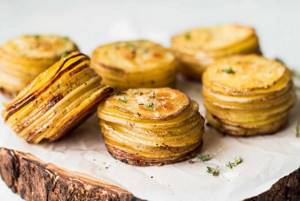
Many people are interested in the benefits of potatoes and whether it is possible to carry out treatment with potatoes at home. Due to its exceptional and varied composition, potatoes have high functionality. The benefits of potatoes for people with metabolic disorders are undeniable, since this product neutralizes the effects of acids in the body, functioning as an alkali. It is enough to eat 1-2 pieces per day and the usefulness of potatoes will be beyond any doubt.
Be sure to read: Time-tested method of fasting according to Nikolaev
Doctors advise their patients to eat potato dishes for gastritis and ulcers. The fact is that the fiber that the product contains does not irritate the intestines and acts very gently, but the product should be consumed only in boiled form.
However, there is a group of people who should keep potato dishes to a minimum in their diet. It has long been proven that potatoes are dangerous for diabetes due to their high zinc content. In addition, polysaccharides (starch), which predominate in potatoes, are considered complex carbohydrates and for a diabetic’s body this will be a serious burden that it may not be able to cope with. And yet, experts disagree on whether it is possible to eat potatoes or avoid them completely if you have diabetes. Some doctors allow the consumption of potatoes, but not more than 250 grams. per day, the main condition is proper preparation (the potatoes must be boiled). This is especially true for those who are planning to eat potatoes if they have type 2 diabetes.
To preserve the beneficial properties of potatoes as much as possible, it is better to cook them in their skins, this will preserve all the vitamins and minerals.
Due to its low calorie content, potatoes are not a prohibited product when following a diet; on the contrary, the body spends more energy on its processing.
If the benefits of potatoes are clear as day, then how can they be harmful? Whether there will be benefit or harm depends on how many calories are in potatoes, or more precisely, in the finished dish made from them. After all, there are a lot of cooking options; if you eat fried potatoes, then heaviness in the stomach and discomfort will be ensured.
As mentioned earlier, potato fruits contain corned beef, but it is also present in tubers. If the vegetables are not processed, have been exposed to light for a long time or are not ripe (this can be understood by their green tint), then the poison content is beyond the normal range. It is necessary to control the quality of the product, comply with storage conditions and periods.
The longer potato tubers are stored, the higher the level of corned beef becomes.
If you are dehydrated, potatoes will become “taboo”, since they remove fluid from the body, but with these properties it will be useful for people with kidney diseases.
How is PP different from a diet?
Most people do not see the difference between PP and diet, often this is what causes disappointment from PP, when people simply do not get the result they dreamed of. What is the main difference between PP and diet, and is it possible to use PP for weight loss?
- What makes pp different from a diet is its purpose! The main goal of any diet is to lose excess weight. The diet itself specifically means cutting down your diet, excluding a number of foods, limiting food and drink, in order to lose excess weight. Depending on the diet, a number of restrictions also change: some diets completely exclude carbohydrates, others strictly limit calories and are based almost entirely on proteins. There are also mono-diets that help you quickly lose weight in an extremely short time. Whatever the diet, the main goal of such nutrition will be rapid weight loss. The main goal of PP is to maintain healthy functioning of the body! Your goal is not to lose weight, but to improve your diet, eat healthy and nutritious foods, and bring your medical indicators back to normal.
- Another huge difference is the diet! PP differs from diet in its rich variety. There are no strict restrictions or fundamental changes in the clause. Your diet is balanced and varied, and you completely plan and think through your menu yourself. The diet includes cereals, meat, fresh vegetables and fruits, and dairy products. If you want to eat dessert, you can safely add it to your diet, the same goes for other goodies that you can treat yourself to from time to time. In this regard, the diet cannot boast of such a variety of table. Most diets come with a ready-made diet or menu that must be strictly followed in order to achieve the desired result.
- An important difference between diet and diet is the state of our health. How often did you notice a deterioration in your physical condition during the diet? Decreased immunity, weakness, depression, hair loss and brittle nails, pale complexion - all these are diet companions. Strict dietary restrictions and the exclusion of many foods from the menu inevitably leads to a deficiency of nutrients, essential vitamins and minerals, and this cannot but affect our health. By the way, it is precisely because of such shortages that our body cannot stand it, and we break off the diet without getting the desired result. PN also differs from a diet in that our health noticeably improves, we experience less stress, and notice positive changes in appearance. The difference between dietary supplements and diet is very clearly visible using the example of the gastrointestinal tract. The diet is often accompanied by stomach pain, cramps, increased gas formation and constipation. While on PP the functioning of the gastrointestinal tract is normalized, digestion processes are improved.
- The time frame is another significant difference between pp and diets. PP is a lifestyle, the formation of new useful habits, a change in lifestyle. There are no short-term stages or frameworks here; you are not limited in time. PP is something you can practice for the rest of your life and not feel disadvantaged. At the same time, the diet always has a strict time frame. On average, diets last from one week to several months, and they should absolutely not be abused.
If there are so many differences, then why is pp for weight loss practiced by so many people? The answer is very simple. The diet of an ordinary average person who does not watch his diet is so replete with unhealthy and fatty foods with empty calories that with the transition to PP his body slowly returns to normal and gets rid of the extra pounds.
Imagine that you always had lunch at McDonald's and one day you decided to replace this ready-made lunch with a cooked one: buckwheat with veal, fresh salad. Your body has received the necessary nutrients, vitamins and minerals, you are not hungry, but at the same time you have consumed much fewer calories. What happens to us after eating unhealthy food? Our body receives “empty calories” high in fat and sugar, and due to the lack of nutrients, after an hour we feel hungry again.
In a sense, PP is a diet, however, it is a diet that does not force you into rigid limits and allows you to lose weight without compromising your health.
Approximate diet for weight loss
Many, of course, are concerned about the question - what can you eat on the diet for weight loss? Fortunately, you won’t have any problems with your diet, because it is quite rich and varied.
PP diet for weight loss:
- Lean meats: veal, beef, chicken, turkey, rabbit.
- Legumes: all types of beans, peas, chickpeas, lentils, soybeans.
- Dairy products: cottage cheese, natural yogurt, kefir, sourdough, all kinds of cheeses. The main thing is to avoid completely low-fat dairy products, as they contain harmful trans fats.
- Cereals: all types of cereals, especially pay attention to buckwheat, quinoa, brown or brown rice, whole-grain oatmeal or even oats.
- Whole wheat bread. Choose coarsely ground bread, it contains slow carbohydrates.
- Pasta made only from durum wheat.
- Fresh vegetables and herbs: Try to eat all kinds of vegetables and herbs fresh, not cooked.
- Fresh fruits.
The weight loss diet recommends avoiding the following foods:
- Fast food, semi-finished products, canned food
- Chocolate bars, crackers, chips and other “junk food”
- Sweet carbonated drinks and packaged juices.
- Ready-made breakfast cereals
- Store-bought sauces and seasonings
- White bread and pastries
- Pastries, cakes and other sweets
Sample menu for weight loss for a week
So that you can get an approximate idea of how to drink on pp, we offer you a sample pp menu for weight loss for a week.
Day one Breakfast: muesli with milk, one fruit. Lunch: baked tuna, salad of fresh herbs and vegetables, dressed with natural yogurt, a piece of whole grain bread. Dinner: spinach frittata, bean salad, a slice of whole grain bread, some natural yogurt with berries as dessert.
Day two Breakfast: cottage cheese, whole grain toast, a little honey and banana. Lunch: salmon with spinach and corn, green leaf salad, a slice of whole grain bread. Dinner: Baked chicken fillet, chickpea salad, natural yogurt with fruit.
Day three Breakfast: oatmeal with milk, one fruit Lunch: Baked vegetables, boiled veal Dinner: Salmon with boiled chickpeas, vegetable salad, dressed with natural yogurt.
Day four Breakfast: banana smoothie, two toasts with fruit. Lunch: Baked pumpkin, boiled chickpeas with vegetables. Dinner: durum wheat pasta, fresh vegetable salad, natural yogurt with fruit.
Day five Breakfast: Muesli with milk, one banana Lunch: Sushi rolls (with salmon, tuna and avocado). Dinner: Lean steak, steamed vegetables, a piece of cheese, some fruit.
Day six Breakfast: Bruschetta with avocado and tomatoes, fruit. Lunch: Boiled beef, fresh vegetable salad, chicken, whole grain bread, a glass of kefir. Dinner: Boiled chicken, fresh vegetable salad with arugula.
Day seven Breakfast: Whole grain toast with avocado, one egg and tomato. Lunch: Sandwich with chicken and green salad, natural yogurt. Dinner: Durum wheat pasta, tofu and fresh herbs salad, banana smoothie based on low-fat milk.
Snack on pp for weight loss: this menu provides two snacks per day. You can choose according to your taste.
- 2 boiled eggs
- Natural yogurt
- 20 raw almonds
- 8 pieces dried apricots
- 250 ml low-fat milk
- One seasonal fruit of your choice
- Bread with hummus
- ¾ cup chickpeas, drizzled with olive oil
- 1 cup vegetable sticks (carrots, celery, cucumber)
- 2 cups popcorn
The number of calories for one day of such a diet is 1500-1600 calories. You can modify this approximate menu for weight loss for a week at your discretion and in accordance with your preferences.

What to eat on a healthy diet?
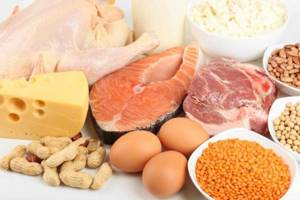
- Fermented milk products with a low fat content are very useful. For example, grainy 0 percent cottage cheese can be an ideal dinner that will not cause any harm to your figure. You can cook porridge with 1.5 percent milk, which is suitable for breakfast.
- Eggs are a healthy source of protein. A protein omelet with herbs, tomatoes and cheese, eaten in the morning, will leave you feeling full for 3-4 hours. A boiled egg will help you meet the required 50 calories for a snack.
- Buckwheat. This is a universal cereal that is rich in iron, which, in turn, supports the functioning of the immune system and has a positive effect on the intestines. Buckwheat can be steamed with boiling water in the evening and mixed with low-fat yogurt or milk in the morning.
- Oatmeal. As a rule, the most important product of all those who are losing weight, which contains carbohydrates, is oatmeal. All nutritionists strongly recommend eating it for breakfast, as it saturates the body with nutrients, perfectly suppresses appetite, and starts the metabolic process. Like a viscous substance, it envelops the stomach, and its fibers protect the mucous walls of this organ; oatmeal also has a beneficial effect in the presence of gastritis or ulcers.
- Chicken breast and turkey meat. Steamed minced chicken cutlets or turkey souffle will be an excellent addition to lunch, a worthy dinner. The most important thing is to follow the cooking rules; under no circumstances should you fry meatballs and cutlets in oil, only steaming is permissible.
- Boiled beef, stewed with carrots is an excellent lunch, which is ideally complemented by grilled vegetables, vegetable stew, for example, zucchini and tomatoes.
Be sure to read: The benefits of a fasting day on green tea
If we talk about fruits, bananas and grapes are considered the most carbohydrate-rich. However, we should not forget their benefits. Despite the high percentage of carbohydrates, bananas have low calorie content. Several years ago, even the banana diet was at the peak of popularity, which included three fruits a day and three cups of coffee with milk without sugar; the duration of such a diet should not exceed more than three days.
Are sweets allowed for those on a diet? Experts give a positive answer. Just buy not harmful chocolates with simple carbohydrates, but natural products based on complex carbohydrate compounds. These include marshmallows, marshmallows, and marmalade. If you eat one thing in the morning, it will not cause damage to your figure. The listed products are necessary for the body, since in addition to carbohydrates they contain important microelements, minerals, and vitamin groups. Many have noted that in most cases, with severe dietary restrictions, health problems begin, nails break, teeth crumble and hair dries out.
All damage occurs due to a lack of nutrients, which the body, weakened by diet, so needs.
Many nutritionists prescribe a course of vitamins that you can get naturally.
Consolidate the result
To prevent the weight from returning, you should adhere to the following results:
- After a diet, you should not overeat. You need to eat in small portions, following a balanced menu. This will prevent the stomach from stretching again.
- Compliance with the principle of fractional nutrition. You need to eat often, but in small amounts. The most high-calorie foods should be eaten in the first half of the day. You need to have dinner with fruits, vegetables, chicken fillet, kefir. Before going to bed, you should refuse food.
- There should be no flavoring additives on the menu. If it is not possible to completely give up salt and sugar, then their amount should be minimized. You need to train yourself to eat foods in their pure form. It is good to replace sugar with honey, but no more than a teaspoon per cup of tea.
- Potatoes should be removed from the diet. It can only be included in dishes combined with other products. In their pure form, potatoes contribute to weight gain and also increase the risk of developing diabetes.
- Following the principle of separate nutrition. This means that carbohydrate foods are not recommended to be combined with animal proteins, but meat goes well with vegetables. This allows the body to digest food faster without storing it in reserve.
- Fatty and fried foods should be removed from the menu. They not only contribute to fat gain, but are also harmful to overall health. Products can be stewed, steamed, boiled.
- It is imperative to arrange fasting days. Once a week is enough to avoid gaining excess weight. It is good to practice kefir and apple fasting days.
- Flour products need to be removed from the menu. Bread is replaced with crispbread or products made from whole grain flour. The menu should include bran and oatmeal.
- You need to drink at least 2 liters of water per day. It helps reduce hunger, removes toxins from the body, and prevents constipation. You should never wash down your food.
Studies have shown that if you drink 0.5 liters of water before meals, you will lose 44% more weight within 12 weeks, compared to those who do not focus on water.

